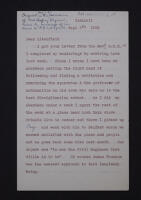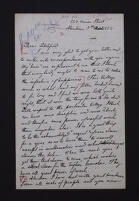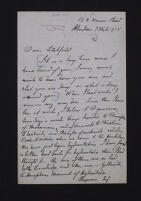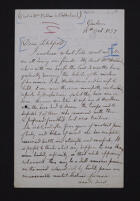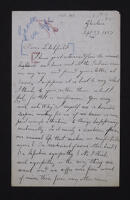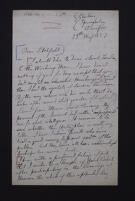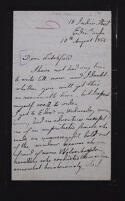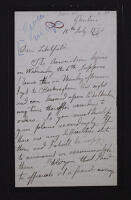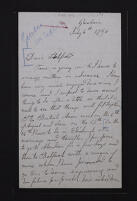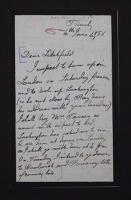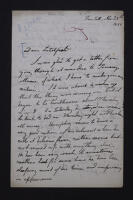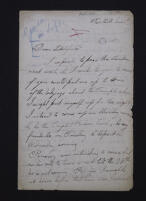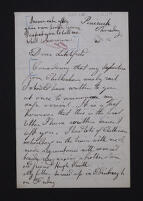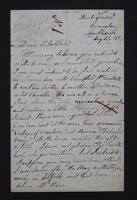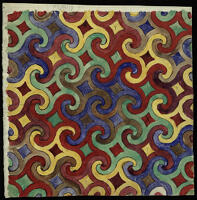Edinburgh - A letter of introduction for James Clerk Maxwell who is about to migrate from Peterhouse to Trinity College [see JDF to WW, 30 Sept. 1850].
Phesdo by Laurencekirk, N.B. - WW has 'been looking into our Transactions I may mention that the author of not the most inconsiderable or least original paper in the collection Mr James Clerk Maxwell (the paper is on the Mathematical Theory of Elastic Solids) is about to enter himself as a freshman at St Peters. He is about 18, is a nephew of Sir George Clerk, not a little uncouth in manners, but...one of the most original young men I ever met with, and with an extraordinary aptitude for physical enquiries'.
Glenlair. Has been at Aberdeen, is now on holiday with friends, invites Litchfield, mentions friends Robert Henry Pomeroy and Wilfred Lucas Heeley, discusses different ways of summing up the personalities of friends.
Litchfield, Richard Buckley (1832-1903) Barrister Clerk to Ecclesiastical Commissioners129 Union Street, Aberdeen. Is pleased with the position at Aberdeen; reflects on his marriage [to Katherine Mary Dewar]; answers Litchfield’s questions with what he describes as a "metaphysical screed;" he gives his opinion on Catholics; a section apparently about marriage has been cut out; sends a paper set for his class and reflects on the quality of answers to the questions.
Litchfield, Richard Buckley (1832-1903) Barrister Clerk to Ecclesiastical Commissioners129 Union Street, Aberdeen. Describes his work in Aberdeen, has found better textbooks by Galbraith & Haughton; has got up a model to show the motions of the rings of satellites; shares what he has been reading; comments on the Senior Wranglers and Smith’s prize men, has a student that he hopes will stay out of a small college “where boating billiards beer &c are more immediate paths to distinction that the pursuit of wisdom either mathematical, classical or social.”
Litchfield, Richard Buckley (1832-1903) Barrister Clerk to Ecclesiastical CommissionersGlenlair. His aunt Mrs Wedderburn has learned of the murders of her cousin John Wedderburn and his wife and child in the Indian rebellion, and her son John and his wife in Moultan have had to disarm troops and dismiss others; is glad to have read the letter [Robert Henry Pomeroy’s last?]; reflects on Good and Evil; has almost finished with his work on Saturn’s Rings; illness continues in the house of the little girl who died.
Litchfield, Richard Buckley (1832-1903) Barrister Clerk to Ecclesiastical CommissionersGlenlair – Reacts to news of Robert Henry Pomeroy’s death in the Indian rebellion and reflects at length on memory and grief; a little girl in one of his men’s houses has died; is at home for a month with his aunt Mrs [Isabella] Wedderburn.
Litchfield, Richard Buckley (1832-1903) Barrister Clerk to Ecclesiastical CommissionersGleinlair, Springholm, Dumfries. Describes a quiet life at Glenlair, and that he has not had a mathematical thought for a fortnight but is likely working subconsciously, shares news of friends and asks for more, notes how different his different his society is in Aberdeen.
Litchfield, Richard Buckley (1832-1903) Barrister Clerk to Ecclesiastical Commissioners18 India Street, Edinburgh. Describes his travels, including coming to the rescue of a woman afraid of some Wolverhampton revellers on the journey there, visits to family, mentions he was photographed four times at Peniciuk because of the light levels; J. F. MacLennan has been getting on with his “Law.”
Litchfield, Richard Buckley (1832-1903) Barrister Clerk to Ecclesiastical CommissionersGlenlair. Discusses travel plans, invites him to visit, is looking for a tutor for a friend’s two boys.
Litchfield, Richard Buckley (1832-1903) Barrister Clerk to Ecclesiastical CommissionersGlenlair. Talks of plans and the amount of work to do at Glenlair, is fitting up a colour weaving machine fit for transportation, his top for doing dynamics; is studying the problem of Saturn’s Rings.
Litchfield, Richard Buckley (1832-1903) Barrister Clerk to Ecclesiastical CommissionersTrinity. Discusses plans to visit London; is looking through papers for some things not to be burnt, notes some are soft and good for packing; will take the Northwestern route to the north, notes that “the transition state from a man into a Don must come at last and it must be painful.”
Litchfield, Richard Buckley (1832-1903) Barrister Clerk to Ecclesiastical CommissionersTrin. Coll. Gives a report of Robert Henry Pomeroy’s illness; is busy with questionists regularly now, is about to get out some optical things to show them; has heard nothing from Cheltenham, Moderator [William Henry] Besant is recovering the use of one side of his face.
Litchfield, Richard Buckley (1832-1903) Barrister Clerk to Ecclesiastical CommissionersTrin. Coll. [Robert Henry] Pomeroy has formed a swimming club at Cambridge; has been busy with electrical reading this term and is working to come up with appropriate ideas, has been ‘sifting’ the theory of light and making everything stand upon experiments and definite assumptions, describes the difference between dogs eyes and human eyes.
Litchfield, Richard Buckley (1832-1903) Barrister Clerk to Ecclesiastical CommissionersPenicuik. Writes after leaving Cheltenham, describes leisure activities at Peniciuk: dog racing, walks, and snowball fights.
Litchfield, Richard Buckley (1832-1903) Barrister Clerk to Ecclesiastical CommissionersBank ground, Coniston, Ambleside. At Coniston reading and resting; discusses the well-regulated family of Charles Benjamin Tayler and their scheme of education; thinks studying the “dark sciences” will repay investigation.
Litchfield, Richard Buckley (1832-1903) Barrister Clerk to Ecclesiastical CommissionersIs offering the portrait of Clerk Maxwell by Lowes Dickinson paid for by the subscribers to the Clerk Maxwell Memorial Fund, and asks if a descriptive plate should be attached to the frame, and what the wording should be.
Refers to a geometrical interpretation of the symbol �-1 by De Morgan, and to Maxwell's elementary manual on matter and motion.
Sidgwick, Henry (1838-1900), philosopherA small group of papers which were passed to Maxwell's cousin Elizabeth Dunn's daughters Margaret and Lucy Dunn. This includes two pieces of James Clerk Maxwell juvenilia: a pen-and-ink drawing dated 1845 of two small figures in a boat on a pond signed JCM 1845, which carries a note on the verso that it was bequeathed by his cousin William Dyce Cay to his niece Isabel Dunn. A home made card reads "James Clerk Maxwell at home Saturday evening Seven o'clock" in a childish hand with a watercolour of the front door of 31 Heriot Row, Edinburgh. This card had been mounted on a stiff album card alongside a photograph of Maxwell as a young man holding a colour top, both now separated from the album card.
There are 18 sheets and cards of geometrical multicoloured designs, described by the donors as "Designs for his tops &c when a boy." These are watercolours and pen-and-ink or pencil, and are accompanied by one round colour top with designs on both sides of a stiff card and a string through the centre. There are two cut out round cards, and two sheets featuring rounds, and one of these has "Miss Cay" written at the top. The other sheets are of various geometrical designs of multiple colours and have pin pricks in them in various places; of these 7 have designs on two sides, and one of these has a drawing of light refracted in a glass and two doodles of a man and a woman on the verso. One of the designs is a cut out paper lattice.
A letter from James Clerk Maxwell to Lizzie [Elizabeth Cay, later Dunn] dated 27-28 May 1858 contains details of preparations of his wedding to Katherine Dewar on 2 June.
There are two printed items: a newspaper cutting referring briefly to Maxwell's Rede Lecture, "On the Telephone" at the Senate House in 1878, and a print of the birthplace of Sir Isaac Newton in Woolsthorpe, drawn by Samuel Sparrow, and engraved by T. Tinkler dated 1772.
Dunn, Lucy Ann (1881-1960), daughter of Elizabeth Cay Dunn[Sent from Terling Place]:- Announces that he and Nora are not going to Rome as they had planned, partly due to his academic work, and partly due to the fact that he has 'been drawn more and more into some [local] quasi-philanthropic work at Cambridge' which involves the reconstructing of the old Mendicity Society on the principles of the London Charity Organisation Society, and which requires his presence there at Christmas time. Discusses the difficulties of the task; in his view, the 'people who ought to be helped 'are 'so often just trembling morally on the verge of helpless pauperism', and it is hard to say whether help 'will cheer and stimulate a man to help himself, or 'push him gently into the passive condition of letting society take him in hand and do what it will with him'.
Discusses Rayleigh's possible transfer to Cambridge, and refers to all the mathematical professors having signed a memorial to urge him to come and succeed Maxwell as Professor of Experimental Physics. Remarks that it is unusual to give up leisure and the comforts of a country house 'unless one is quite sure that one's duty to society requires it.' Asks her for her opinion of Ada [Benson, engaged to be married], and asks her to send him Ada's address. States that they were 'very much delighted to hear of it' and that [Henry Weston?] Eve has told them 'good things of him [Andrew McDowall, Ada's fiancé].' Reports that they have seen Arthur, but not William, who is not very well. Sends his and Nora's love to Edward and the children, and asks how much came from the 'Personal Appeal' after all.
Two photogravures, one of Maxwell as a young man holding a colour wheel, and the other as an adult, in a booklet marking the centenary of Maxwell's birth.
UnidentifiedThe 3rd edition of Clerk Maxwell's work was published in 1892
Three notebooks carry Forsyth's name on front and carry titles, two of them "Kinetic Theory of Gases" and the third "The Method of Variations of Parameters applied to the Planetary Theory". A fourth notebook carries no title and lacks its back pages and back cover, but carries the note on the inside front cover, "Maxwell on Radiation, Prob Paper Wed Jan 1 (73, Collapsing strain of cylinder (Rankine)".
Forsyth, Andrew Russell (1858-1942), mathematicianArdhallow, Dunoon.—Suggests arrangements for meeting, and discusses the citation of theorems, etc., in connection with his book (A Treatise on Electricity and Magnetism).
Trinity College stories gathered by McTaggart from Henry Jackson and others, numbered and arranged by date from 1896 to 1924. Includes light verses related to College matters by James Clerk Maxwell (no. 398), F. M. Cornford (no. 434, 445), and J. K. Stephen (no. 442), and a cutting of a poem about William Whewell by [Tom Taylor?] (no. 401); printed obituaries of William Hepworth Thompson, a letter from James Mayo dated 20 Jan. 1905, and two letters from Henry Jackson dated 8-9 Oct. 1879.
McTaggart, John McTaggart Ellis (1866-1925), philosopherBooklet, Handbook for the Clerk Maxwell Centenary Celebration to accompany the celebrations at the University of Cambridge 1 and 2 October, 1931, with a photogravure of Maxwell by Emery Walker Ltd., and images of Glenlair House, a colour top, colour house, spinning coil, apparatus for experiments on the viscosity of gasses, and the outside of the Cavendish Laboratory. Accompanied by a memorial booklet of two photogravures, of Maxwell as a young man with a colour top, and as an older man.
Committee for the Clerk Maxwell Centenary CelebrationMonte Generoso (Mendrisio, Switzerland).—It is very cold. Gives an account of their travels since they left Malta. Refers to a review by Tait. Hopes that the news from Belgium ‘has given all the cardinals the stomach-ache’.
—————
Transcript
Monte Generoso June 16/78
My dearest Fred—Here we are at length, you see; if my writing is illegible, it is not that I tremble, but that I am cold. We certainly did not expect to be sent on an arctic expedition without any lime-juice. It isn’t the temperature that matters so much as the damp, and the house being built without fireplaces. I will however recount all the misfortunes that have happened to us since we left Malta. I supposed that a French boat would be better than an Italian, and so took passage in a Fraysinet; being also tempted by the prospect of going straight to Genoa instead of calling at a lot of hot and malarious Italian towns. The boat was small, crowded and uncomfortable, but would not have been very bad but for the odour of an unfortunate cripple in the next cabin. (If I get confused, remember that it is sunday† morning, and some excellent folks are clacking away to A.G. {1} just outside). We got to Genoa in time for an early fast train which would have taken us to Milan in comfortable time for lunch; but the sanitary authority chose to come at 8 instead of 6 to set us free, for which the Superior Being said he ought to have 4 dozen on the spot. The Superior Being was Major Dudley North, aide-de-camp to the late Gov[erno]r of Malta. After we had given him that name (which he thoroughly deserves) I overheard a little frenchman saying “ce grand anglais n’est pas fait comme les autres parce que les autres sont plus petits”. The S.B. was exceedingly kind to us. He said no people were so obstinate as women and invalids, and it was necessary that some one should give orders and be responsible. He and Mr Magistrate-and-Collector Sharpe, (an old maid on his way home from India, just like Jack when he first comes in in “a terrible villain”) travelled with us as far as Alessandria, and took care of us. Then the government contrived that we should arrive at Milan at half past nine instead of half past seven, and the Lord provided an Italian nobleman for the last two hours who insisted on keeping all the windows open at his end of the carriage. Of course I caught cold being thoroughly worn out by getting up at 6 for the sanitary who didn’t come, and an 8 hours journey. We were at Milan during those damned Xtian festivals so that everything was shut up and Brioschi was away at Rome. Our arrival in Switzerland was the signal for a rainy season which has been bottled up for months. We had to wait a day for the rain at Mendrisio, where we were told that the mule ride up here was very fatiguing[,] especially for those unaccustomed to the animal. So I was persuaded to be carried up in a chair like this. [Alongside is a sketch of a seated man being carried in a litter by two others.] After a little while one learns a peculiar trick of holding on, and then it is not quite so bad. Lucy was on a mule with a stumpy tail, and had the umbrellas and wraps strapped on behind her, so that she looked like Dian stalking to the chase. [Alongside is a sketch of a rear view of a person seated on a mule, with ‘umbrellas and wraps’ strapped behind.] The road is sheltered until the last few steps, when one comes on the open space where the hotel is. That gave me a violent toothache at once. They say Addington Symonds has just been here for a month, and derived enormous benefit; but I suppose God sharpened the wind to the shorn lamb, as usual. The people here can’t remember it so cold as it became yesterday. I went to bed with a jorum of arrowroot gruel, strongly flavoured with brandy, and Georgie’s hot-water-bottle which was an infinite comfort.
Just got your letter and delighted at the prospect it holds out. I saw a proof of Tait’s review which Macmillans sent me—I would rather Clerk Maxwell had done it, because he has more than one idea; Tait divides all mathematical books into those which are friendly or not friendly to the study of quaternions. We have always been on the best of terms; my review of the unseen universe {2} was entirely complimentary to him and Balfour Stewart, and only used the book as a peg on which to hang shots at other things—(good metaphor—wants working up). I am very much better for the news from Belgium, and hope it has given all the cardinals the stomach-ache. The torpedo is protected from sardines: he carries an oil-box in which he packs them when captured, and in this way he pays his way. Love to Georgie & Alice, with many kisses, from
Thy
Willi {3}
—————
{1} i.e. Almighty God. Cf. the second postscript to CLIF A4/13b.
{2} The Unseen Universe, by Balfour Stewart and P. G. Tait (1875). Clifford’s response to this book was published in the Fortnightly Review (new series, vol. xvii, pp. 776-93) and reprinted in Lectures and Essays (vol. i, pp. 228-53).
{3} Reading uncertain. Probably ‘Willi’ altered from ‘Willy’.
Trinity College, Cambridge.—Thanks them for a dressing-gown. Is feeling better, and got through his Whewell lecture without ill effects. There is concern that the Tests Bill will be shelved again, but the evidence presented by the Master and Appleton is good. Maxwell comes to see him and gives him ideas. Hopes they are both better.
—————
Transcript
Trinity College, Cambridge
Saturday
May 6
Dear Papa & Mama
How very kind of you to send me such a lovely thing. I have been wearing it nearly ever since. The only thing I regret is that I cannot go out of doors in it—I should look so swell if I walked around the paddock plunged in deep thought and a dressing gown. I am very much better, and have been nearly free from pain for several days: on Thursday I went for quite a long walk with Cayley, and yesterday I went out while it was sunny without being muffled up. Also I got through the Whewell lecture (one of a course that Sidgwick has organized) without ill effects. It rather frightened me, being much harder than my ordinary lectures; viz:, an hour and a half of steady talk about philosophical subjects where one had to be very careful of one’s terms. We are in a great state of mind about the Tests Bill, lest if the Lords should adopt the recommendations of the committee and stick to them, they may gain time enough to get it shelved again. The evidence of our master before the committee is very good; and Appleton’s is lovely. {1} I am so sorry you can’t come up. The sun is quite bright today, and it looks so tempting—on the other hand I burn to be at some equations which I know only want shaking to give lots of Theorems. Maxwell comes often to see me and gives me ideas. Good bye. I hope you are both better. Give my love to Eliza. Kate is to stay with you when I am at home.
your most loving son
Willie.
—————
{1} The House of Lords went into committee to discuss the University Tests Bill some time before 9 May 1871. The evidence presented to the committee by C. E. Appleton is referred to in The Times of that day (p. 5).
